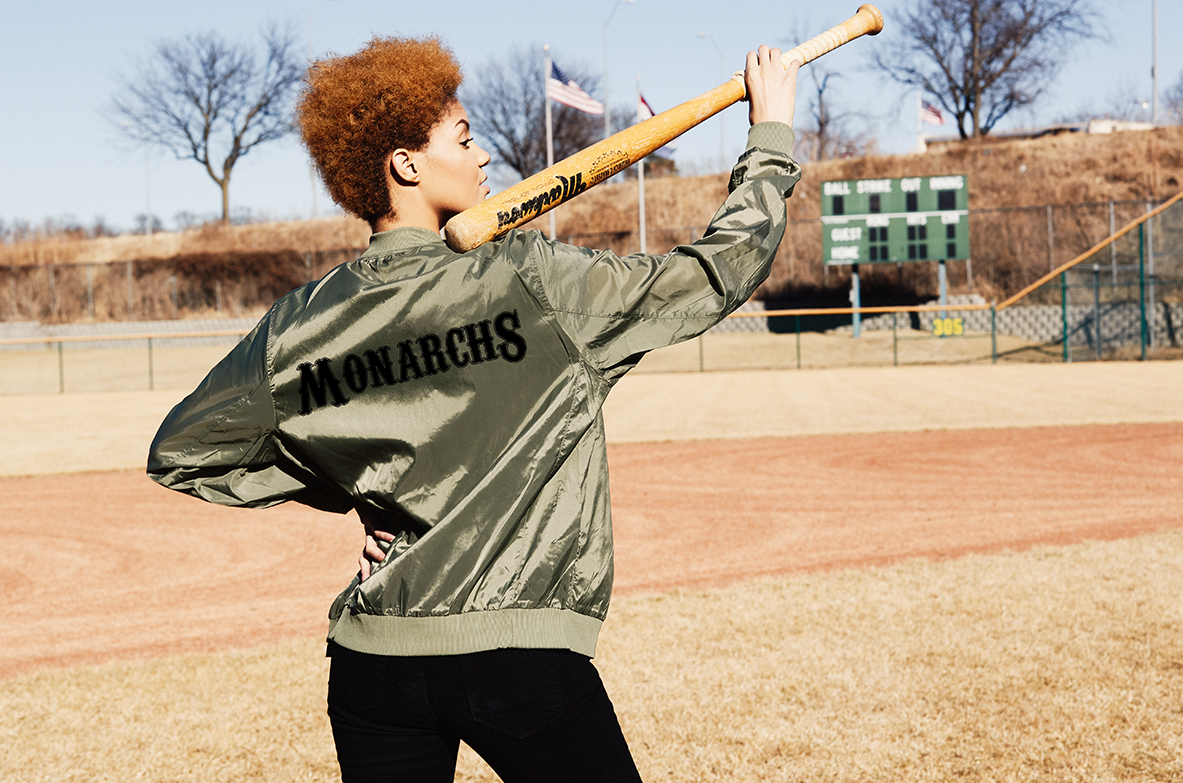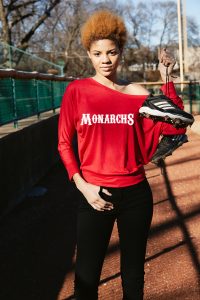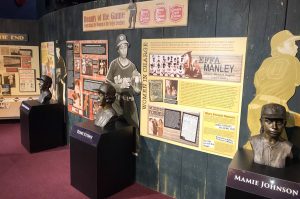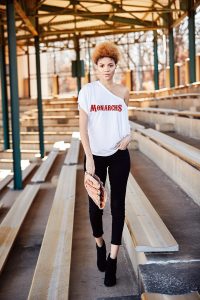Toni Stone, Connie Morgan and Mamie Johnson — the only three women to play in the Negro baseball leagues — remain an inspiration to female entrepreneurs in male-dominated industries some 50 years later, said Thalia Cherry.
“It’s still important for us to carve out a great space for ourselves, a great niche, and do the great work in that space,” said Cherry, owner of Cherry, a Kansas City-based sports gear company.
To celebrate the trio of baseball pioneers — all of whom played for the Indianapolis Clowns in the 1950s, though Stone also played with the Kansas City Monarchs — Cherry recently launched its new clothing collection, “Beauty of the Game.” The release coincided with the opening of an exhibit by the same name at the Negro Leagues Baseball Museum in Kansas City.
Both efforts dovetail with the completion and opening of the Women of the Negro Leagues Field, said Ray Doswell, vice-president of curatorial services at the Negro Leagues Baseball Museum. Supported and created by Major League Baseball, the softball field is already in use by the women’s collegiate team at the University of Missouri-Kansas City.
Legacy-lined homage
Being a black woman in the 1950s meant double-segregation, Cherry said. Players like Stone, Morgan and Johnson not only were excluded from white teams, but typically were not allowed on the roster alongside men, she said.
Lessons from that time in American history still apply today, Cherry added.
Funded and supported by Kansas City Southern Lines, the museum exhibit includes a collection of data displayed in graphics by African-American designer Reva Hendon, as well as busts of the three female players, which were sculpted by Kwan Wu of the University of Kansas, Doswell said.
Mamie Johnson, who was the last surviving member of the trio, attended the unveiling of the busts in November 2016 and even signed a replica uniform, which is on display next to the Beauty of the Game exhibit. She died before the exhibit officially opened this year, Doswell said.
The exhibit also includes history on female owners of baseball teams, including baseball pioneer Effa Manley, who co-owned the Newark Eagles with her husband, Abe. While Effa Manley appears to be white, history on her ethnicity was “a matter of controversy,” Doswell said, adding that Effa Manley was of mixed race.
“She married a black man, and she lived as a black woman, so that’s how she identified,” Doswell said. Effa Manley was the first woman to be elected to the National Baseball Hall of Fame.
For Cherry, an African-American woman in her fifties, her inspiration for the clothing collection goes much deeper, she said. Cherry grew up in 1960s Kansas City, Kansas, when communities started integrating. But she recalls, for example, when her family shopped at a store called Jupiter because they were still unwelcome at J.C. Penney and other department stores.
“I think my parents and grandparents were so good at sheltering and not having the conversations in front of us; I didn’t even know we couldn’t go into Penney’s,” Cherry said. “We never talked about it, but you kind of knew things without it being communicated.”
Cherry also recalled moving into an all-white neighborhood. At least one of her family’s new neighbors was unhappy about it, she said.
“None of this you can really reconcile when you’re that young; like, it doesn’t make sense,” she said, adding that she attended all-white schools. “For me, the integration was happening and I didn’t even know I was ‘the integration.’”
Unity of the game
As a firm believer that sports and fashion have been “instrumental in every major shift of America,” Cherry said, it would be an honor to become a part of the next movement.
“It unites us; there’s nothing more powerful when your city team wins,” she said. “Everybody wants to be a part of that greatness, that energy. Our desire and hope is that people feel that when they wear our products too.”
Beauty of the Game products are on display and available for purchase at the Negro Leagues Baseball Museum and also on Cherry’s website. In collaboration with Baldwin, the collection includes cropped hoodies, bomber jackets, crossover sweatshirts and dresses that bear the team names of the Clowns and the Monarchs. The purpose was to commemorate the three women’s historical contribution to baseball while making a trendy vintage look to the collection, Cherry said.
The company — chosen as one of the Goldman Sachs Small Business awardees for the 10,000 Small Business program — also plans to open markets to sell Beauty of the Game products in Atlanta, Dallas and Charlotte, N.C., museums that showcase the women who played in the Negro Leagues, Cherry said.
“I think the thing that’s really on my heart the most is how it’s such an honor to be able to contribute to a part of history,” she said.







































